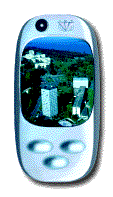
Max-Henri Cadet, Legal Officer and Team Leader, IMT-Circulation Project, ITU General Secretariat; Christopher Wildey, Senior Manager responsible for global circulation at Nokia (United Kingdom); and Thomas Sidenbladh,Director of Government Relations at Ericsson and Chairman of CEPT PT1 Regulatory Sub-group, dealing with global circulation
The coming years will see a host of new third-generation (3G) mobile and wireless communication networks capable of supporting innovative multimedia services, beyond the capability of second-generation systems such as GSM, CDMA or D-AMPS. They will build upon standards from the IMT-2000 family, a concept for advanced global communication systems developed within the International Telecommunication Union (ITU). Such networks will be deployed in countries all over the world. Already, the Asia-Pacific region is set to launch 3G networks this year. Europe and the Americas are expected to follow in 2002.

Users of IMT-2000 systems will want to carry their IMT-2000 terminals with them anywhere in the world. They will want to use these terminals in any country where IMT-2000 networks exist and wherever transmission is authorized. This concept is called global circulation. Mobile operators have already stated that global circulation holds the key to the successful deployment of IMT-2000.
Global circulation is advantageous for IMT-2000 system operators, as it will expand their markets and their prospects for earning additional revenue. More importantly, it will benefit the many millions of users, allowing them to use their phone as a personal communicator from almost anywhere in the world. There are also advantages for administrations, since the global circulation of IMT-2000 terminals will not only allow national economies to reap some of the benefits of 3G systems, but will also pave the way for the mobile multimedia sector to become an important part of the national economy.
Most countries employ a system of product certification or type approval for radio terminals. This ensures that terminals sold in a country conform to the prescribed standards and regulations. These systems are a safeguard for the customer not to be cheated by defective products. However, global circulation requires a different approach.
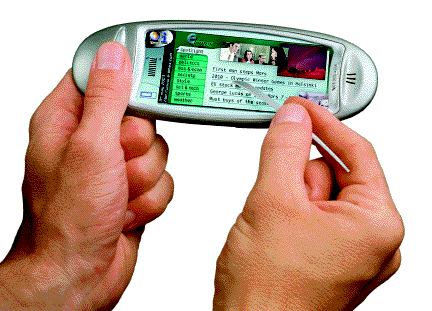
Regulators and national policy-makers throughout the world will play a particularly important role in the development of any arrangements for the global circulation of IMT-2000 terminal equipment. It is desirable that all countries adhere to a basic set of commonly agreed principles and actions aimed at enabling global circulation. These matters are being discussed extensively within Working Party 8F of the ITU Radiocommunication Sector (ITU-R). The ITU Secretary-General has also issued Circular Letter No. 97 (dated 22 January 2001) to seek the views of administrations and identify any issues, which they may face when authorizing unhindered global circulation.
There are three basic principles on how unhindered global circulation of terminals can be achieved:
- The personal use by visitors of IMT-2000 terminals should not require any individual licence.
- Such terminals should not be subject to additional certification or type approval procedures.
- The national customs authorities should exempt IMT-2000 terminals, intended for personal use by visitors, from all customs duties or other official charges.
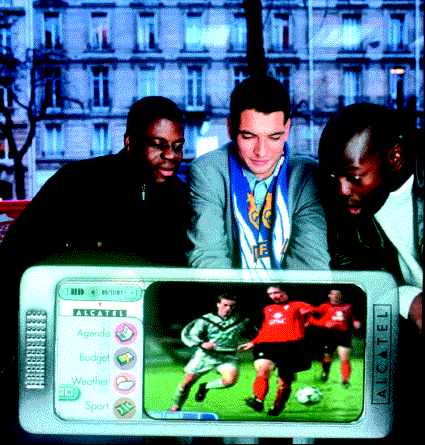
To make this possible, regulators need to be sufficiently satisfied that the global circulation and use of terminals is in conformity with the laws and regulations in the visited country. This trust must build upon the understanding that terminals:
- conform to IMT-2000 standards;
- do not cause unacceptable interference (the receive-before-transmit principle is one way of eliminating such interference). This means that the terminal should not transmit before it has received a signal from an authorized network.
- comply with unwanted emission limits according to relevant ITU Recommendations.
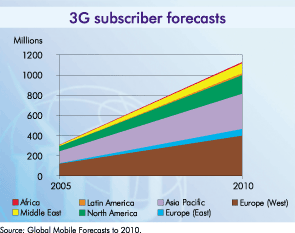
To facilitate global circulation, national authorities must be reassured that an IMT-2000 network can control terminals more easily than the most sophisticated administrative system. With IMT-2000 standards, the network can easily disconnect any terminal that is causing problems. Therefore, in order to achieve practicable global circulation arrangements that are free from problems, administrations should consider how to use the technical capabilities built into IMT-2000 networks. The GSM experience points to the low likelihood of problems with global circulation. Likewise, the circulation of 3G terminals throughout the world could function very smoothly. IMT-2000 system operators could take full responsibility for their networks and there would be no need for additional terminal surveillance.
Also, terminal manufacturers are a strong harmonizing force when it comes to the functionality of the terminals. If the emission requirements for terminals are harmonized internationally, the economic advantages of long product series will make the production of sub-standard terminals, which may cause unacceptable interference, totally impracticable and unprofitable.
In addressing the requirements for global circulation, the three principles stated earlier should not require any special administrative arrangements that would lead to excessive regulation. Circulation arrangements should be aimed at simplifying, and not increasing, existing regulation.
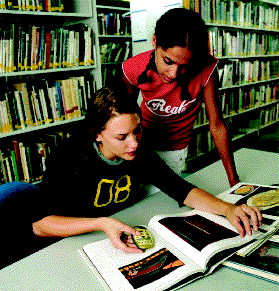
ITU has already established a special project team on Global Circulation under the scope of the IMT-2000 Project (see www.itu.int/osg/imt-project). One of the responsibilities of this team is to advise the Secretary-General and ITU-R Working Party 8F on the way ahead to facilitate global circulation. The team is consulting with administrations worldwide, as well as with industry experts. During this period, international, regional and national authorities are encouraged to participate in this process to remove any remaining obstacles that may hinder the global circulation of IMT-2000 terminals.
The expectations are that ITU, with its long-standing experience in building consensus among government and industry will, by the end of 2001, provide a framework for global circulation, clearing the way for the development of the new mobile information society.